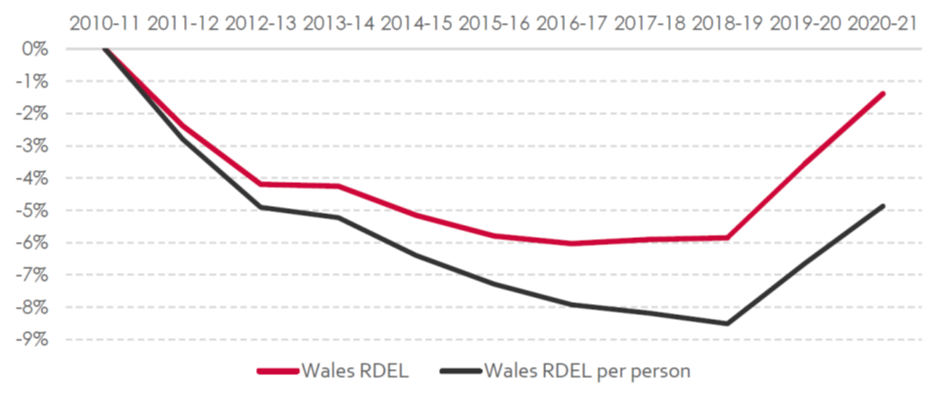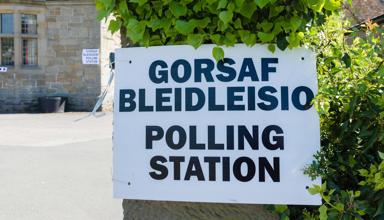On 4 September, the UK Government published its Spending Round 2019, setting out its revenue spending plans (day-to-day spending such as staff costs) for UK government departments and the devolved administrations for the 2020-21 financial year. The spending round is for one financial year due to the uncertainty around Brexit, rather than the multi-year settlement originally envisaged. A multi-year spending review will follow in 2020.
The UK Government states that the spending round will deliver the fastest planned UK growth in revenue spending in 15 years, an increase of 4.1% in real terms (once inflation has been taken into account) between 2019-20 and 2020-21. Amongst the allocations are an additional £2 billion to “help the UK to establish a new relationship with the EU, and capitalise on the opportunities created by Brexit”, and additional spending in England on devolved areas such as health, social care and education.
What implications does this have for the Welsh Government’s budget, and how has the Welsh Government responded to the announcement?
How much additional funding will Wales get, and how has this been calculated?
Before block grant adjustments, the Welsh Government’s fiscal revenue allocation for 2020-21 would increase by £593 million, or 2.3% in real terms. This is lower than the 4.1% real terms increase across the UK, but higher than the percentage increases form the other devolved administrations.
Wales Fiscal Analysis highlights that, in real terms, the Welsh Government’s revenue budget in 2020-21 will be around 1% lower than its 2010-11 peak, and 5% lower per person than in 2010-11.
Figure 1: Real terms change in Welsh Government’s revenue budget compared to 2010-11
 Source: Wales Fiscal Analysis, UK Spending Review 2019: the implications for Wales
Source: Wales Fiscal Analysis, UK Spending Review 2019: the implications for Wales
The increase before block grant adjustments is the figure quoted in the Chancellor’s speech and press coverage as being the increase in funds allocated to Wales. This results from increased UK Government revenue allocations to devolved areas such as health and education in England. As these areas are devolved, the Welsh Government receives Barnett consequentials, which it can spend according to its priorities, as set out in the graphic below.
However, in practice the Welsh Government’s funding from the UK Government will be adjusted to account for tax devolution, as agreed in the Fiscal Framework .
The Welsh Government’s final block grant for 2020-21 will be calculated once relevant UK tax rates are set later this year in the UK Budget 2019 and the block grant adjustment has been applied. The Spending Round documentation suggests that the Welsh Government’s fiscal revenue will increase from £11.9 billion in 2019-20 to £12.4 billion in 2020-21, a 2.1% real-terms increase.
The Welsh Government states that its capital budget for 2020-21 increased by £18 million as a result of the Spending Round. In 2020-21 this will increase to £2.3 billion from £2.2 billion in 2019-20.
What is the Welsh Government’s response to the Spending Round?
On 4 September, the Minister for Finance and Trefnydd responded to the Spending Round. She stated that:
- Following the Spending Round, the Welsh Government’s budget for 2020-21 will be 2% lower in real terms than in 2010-11;
- The support to address even a proportion of the impact of Brexit will require considerably more public spending than was announced by the Chancellor of the Exchequer. The Minister has raised this with the UK Government, however she says that she had not had any assurance that the necessary additional funds will come to Wales;
- The Minister expressed her disappointment that the Chancellor of the Exchequer did not announce details of replacements for EU funding; and
- The Minister highlighted that the Welsh Government will now publish the budget for 2020-21 earlier than it had originally suggested, to provide certainty to stakeholders.
The Minister had also previously outlined her concerns that the Spending Round would not give Welsh public services certainty to plan for financial arrangements over a three-year period.
The Minister will make an oral statement in Plenary on 17 September, where she will provide more detail on the actions the Welsh Government is taking to respond to the Spending Round and the UK Government’s approach to public finances.
The Welsh Government’s draft budget will set out the Welsh Government’s spending, taxation and borrowing plans for 2020-21. Ahead of this, Wales Fiscal Analysis’ publication on the UK Spending Review 2019: the implications for Wales sets out details of some of the choices the Welsh Government will need to make in its budget following the settlement from the UK Government.
Article by Gareth Thomas, Senedd Research, National Assembly for Wales







